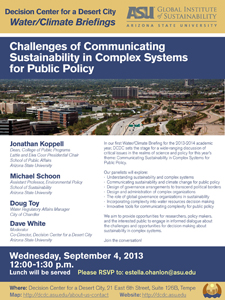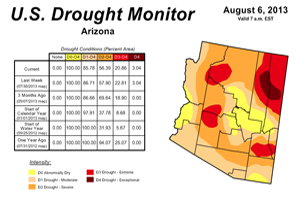Advancing Climate Adaptation in Flagstaff: Expert Discussion Session
On August 20, 2013 at the Global Institute of Sustainability, in preparation for workshops with Flagstaff’s Public Works and Police Departments, a team of researchers is convening a small workshop with experts on climate and health, transportation materials, fire, storm water management, and emergency management. This discussion session will lead to a deeper understanding of the critical issues faced by the two departments. The Flagstaff City Council recently adopted strategies based upon the City’s 2012 City of Flagstaff Resiliency and Preparedness Study. Flagstaff’s management team hopes to implement these strategies through its performance measure and budgeting processes. The University of Arizona’s Climate Assessment for the Southwest (CLIMAS) program and Arizona State University’s Decision Center for a Desert City (DCDC) and Center for Integrated Solutions to Climate Challenges is assisting the City in this process. The team will work with Flagstaff’s management team to convene workshops targeted at the police and public works departments. The goals for the workshops will be to identify adaptation strategies that can be implemented now and planned for in the medium- and long-terms as climate and social conditions evolve. Once these strategies have been identified, we will develop performance measures and progress indicators for each strategy.
Expert Discussion Session Objectives
- Document expert opinions on how human vulnerability as they relate to health, storm water drainage, street pavement, forest fire, population, and emergency managers will be impacted by climate changes (impacts germane to the City of Flagstaff public works and police departments).
- Develop an understanding of the ideal strategies available to adapt to the aforementioned climate change impacts, the information necessary to implement those strategies, and metrics to measure their success (ostensibly improving resilience).
- Identify, in general, the information and tasks Flagstaff will likely need to plan and implement these strategies. This information will be incorporated into subsequent workshops with the City of Flagstaff.
Agenda
- 10:00 – 10:20 Introductions and Overview of Project (Zack Guido)
- 10:20 – 10:35 Overview of Flagstaff Resiliency Study (Nicole Woodman)
- 10:35 – 10:50 Why we are here (Ray Quay)
- 10:50 – 11:50 Q1: In your expertise area, in what ways will human vulnerability be impacted by climate changes? What impacts could potentially be the most severe? (All)
- 11:50 – 12:00 Break
- 12:00 – 12:30 Working Lunch: Q1a: What are the overlapping issues of these topics? (All)
- 12:30 – 1:30 Q2: If you were charged with developing strategies to deal with these risks in Flagstaff, what strategies would you focus on? (All)
- 1:30 – 1:50 Break
- 1:50 – 2:50 Q3: What information and or tasks would you need to plan and implement these strategies? (All)
- 2:50 – 3:30 Next steps (Ray Quay)
- 3:30 – 4:00 Q4: In your area of expertise, what practical metrics would you use to estimate or rate resiliency to climate change? (All)
Participants
- Mark Brehl, City of Flagstaff
- Mariano Gonzales, AZ Dept. of Emergency Management
- Jon Fuller, JE Fuller/Hydrology & Geomorphology Inc.
- Abe Springer, NAU, School of Earth Science & Environmental Sustainability
- Shane Underwood, ASU, Department of Civil, Environmental, & Sustainable Engineering
- Vjollca Berisha, Epidemiology Maricopa County Department of Public Health
- Kimberly Sharp, Comprehensive Planning Manager, City of Flagstaff
- Tamara Lawless (convener), City of Flagstaff
- Zack Guido (convener), University of Arizona
- Michele Roy (convener), Arizona State University
- Ray Quay (convener), Arizona State University
- Nicole Woodman (convener), Sustainability Manager, City of Flagstaff



 Tracking drought blends science and art. No single definition of drought works for all circumstances, so people rely on drought indices to detect and measure droughts. But no single index works under all circumstances, either. That’s why we need the Drought Monitor, a synthesis of multiple indices and impacts, that represents a consensus of federal and academic scientists. The product will be refined over time as find ways to make it better reflect the needs of decision-makers and others who use the information.
Tracking drought blends science and art. No single definition of drought works for all circumstances, so people rely on drought indices to detect and measure droughts. But no single index works under all circumstances, either. That’s why we need the Drought Monitor, a synthesis of multiple indices and impacts, that represents a consensus of federal and academic scientists. The product will be refined over time as find ways to make it better reflect the needs of decision-makers and others who use the information.